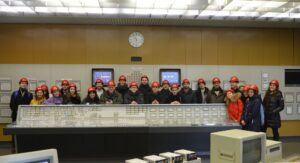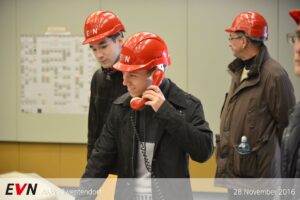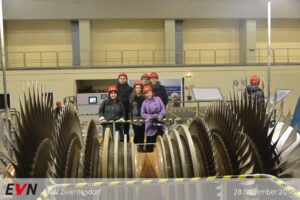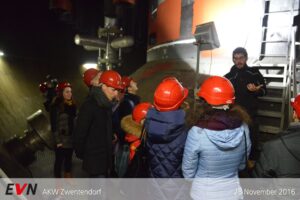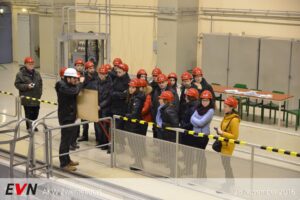 The internship for the Belarusian State University (BSU) was held from 21 to 29 November 2016 and organized by the regional network for education and training in nuclear technology “STAR-NET” in cooperation with the International Atomic Energy Agency and Nuclear Knowledge Management Institute (Vienna) within framework of the State Programme of the Republic of Belarus on human resource development for nuclear power industry. The group included students and teachers from the physical and chemical faculties of BSU and students from the International Sakharov Environmental Institute of BSU.
The internship for the Belarusian State University (BSU) was held from 21 to 29 November 2016 and organized by the regional network for education and training in nuclear technology “STAR-NET” in cooperation with the International Atomic Energy Agency and Nuclear Knowledge Management Institute (Vienna) within framework of the State Programme of the Republic of Belarus on human resource development for nuclear power industry. The group included students and teachers from the physical and chemical faculties of BSU and students from the International Sakharov Environmental Institute of BSU.
At the opening session John de Grosbois, the Head of the Nuclear Knowledge Management Section at the IAEA spoke about the relevance of the nuclear knowledge management, its objectives and tasks toward the international nuclear community.
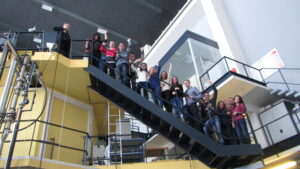 During the internship the students were presented lectures from IAEA staff, STAR-NET and leading specialists in various fields of nuclear energy. Students were introduced to the structure of the IAEA, its goals, objectives and methods of work aimed at the development of safe nuclear energy. The IAEA nuclear safety standards system, knowledge management in nuclear organizations and nuclear power plant management system were addressed as well as other issues. The students also acquainted with current trends in the field of modular and research reactors. Certain lectures and practical training was adapted to the nuclear programme of the Republic of Belarus; in particular, the example of the Belarusian nuclear power plant was taken to consider the issues of the national nuclear infrastructure development.
During the internship the students were presented lectures from IAEA staff, STAR-NET and leading specialists in various fields of nuclear energy. Students were introduced to the structure of the IAEA, its goals, objectives and methods of work aimed at the development of safe nuclear energy. The IAEA nuclear safety standards system, knowledge management in nuclear organizations and nuclear power plant management system were addressed as well as other issues. The students also acquainted with current trends in the field of modular and research reactors. Certain lectures and practical training was adapted to the nuclear programme of the Republic of Belarus; in particular, the example of the Belarusian nuclear power plant was taken to consider the issues of the national nuclear infrastructure development.
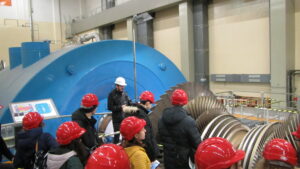 A special attention was paid to the work with information systems in the nuclear industry. At the workshops, students familiarized themselves with the structure of the electronic library of the IAEA and practiced with the information search system NUCLEUS. The cyber learning platform CLP4NET containing lectures’ notes, training aids and technical information on the topical areas was actively used during the practical sessions and self-study.
A special attention was paid to the work with information systems in the nuclear industry. At the workshops, students familiarized themselves with the structure of the electronic library of the IAEA and practiced with the information search system NUCLEUS. The cyber learning platform CLP4NET containing lectures’ notes, training aids and technical information on the topical areas was actively used during the practical sessions and self-study.
The students visited the research reactor TRIGA of the Atominstitute in Vienna, the IAEA Laboratories in Seibersdorf and the nuclear power plant Zwentendorf . During these visits the students acquainted with the equipment of those centres, got the information about the tasks and projects implemented by the IAEA laboratories and used the possibility to communicate with the specialists.
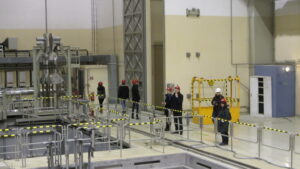 Students also visited the IAEA Incident and Emergency Centre whose staff explained its activities and structure, and its work in case of emergencies that was demonstrated by practical examples. The possibilities of IAEA for on-line monitoring the radiation situation in the world were also demonstrated.
Students also visited the IAEA Incident and Emergency Centre whose staff explained its activities and structure, and its work in case of emergencies that was demonstrated by practical examples. The possibilities of IAEA for on-line monitoring the radiation situation in the world were also demonstrated.
At the end of the practice, the Round Table on topical issues of development of nuclear power with participation of students and leading lecturers was hold. The importance of international cooperation for the peaceful and safe development in this area was noted, as well as the need for such courses with the participation of the IAEA and the STAR-NET for future specialists from the countries, starting their way in the nuclear power programme.
